Amnesty WA bringing you the stories you need to hear, things you need to know, and ways you can help to defend human rights.
Don't wanna be here? Send us removal request.
Text
DOING JUSTICE HAS MOVED.
Stay updated with all things Amnesty WA at our new blog home amnestywa.wordpress.com!
0 notes
Text
Guest Speaker Profile: Carolyn Lewis
Carolyn Lewis has been a dynamic campaigner for the rights of Indigenous Australian’s for many years and has recently been moved to focus on deaths in custody as a primary area for change and reform, as well as working with women in various spaces shifting ideologies in a changing world.
A mother, grandmother, teacher, trainer and student, Carolyn is a member of the First Nations Deaths In Custody Watch Committee who continues to gently but firmly press on with campaigning to address issues in the communities around her. She is willing to lend her strong voice to others that can’t speak out.
Carolyn is a Nanda-Widi Noongar woman who grew up in Perth and has strong cultural ties across the state of Western Australia. Activism is in her blood; since she was a child Carolyn saw her parents take an active stance towards Aboriginal affairs. At 18, she followed her father to Canberra where her attention was widened to issues of a national focus, and she largely remained there on and off for a period of nine years, marching the streets and making her voice heard. Carolyn believes big change can come about through speaking to all people, and that sharing knowledge and stories to bring light to injustices can and will facilitate awareness and conversation.
As a trained educator Carolyn has spent years in lecturing and training roles and employment and career guidance. She is currently studying towards a Graduate Diploma in Indigenous Research and has plans for a PhD.
In 2014, Carolyn experienced a third family member dying in a custodial space and since then has been campaigning for Australia-wide custodial change and reform. The death of young Ms Dhu in custody in South Hedland for unpaid fines affected Carolyn deeply, coinciding with her fiftieth birthday, and she has since worked tirelessly with the First Nations Deaths In Custody Watch Committee to bring some accountability to the factors that played a part. Key areas of focus are legislation and policy in Western Australia, systemic and institutional racism and inequity in the medical communities. She regularly advocates for those in custody with a view of eradicating unnecessary deaths.
Unfortunately Carolyn acknowledges there is a lot of work to be done. The Deaths In Custody Watch Committee is drastically underfunded compared to the time of its inception in 1992, and a lot of the 300+ recommendations it brought about not adhered to, despite there being statistical evidence that the implementation of these recommendations has significantly reduced deaths in custody in New South Wales. Carolyn is not deterred and continues her work in this arena by speaking out publicly on radio and at events, and sourcing representation and legal assistance for aboriginals in custody. “Everyone has to do their little bit to help where they can. Stay true to yourself and what’s right.”
The range of projects and activities that Carolyn is engaged with are all geared towards connecting all women, sharing information, and building on courage’s conversation to create change. When guest lecturing, Carolyn says audiences are regularly flabbergasted by the realities of the stories she relays, and often embarrassed and horrified. People are listening though, and coming together and talking, and she believes big change can come about from this. “We all need to work together for change to happen. All people.” Carolyn is currently involved in two research projects: one in women’s prisons researching educational programs, and one sharing letters with their original intended recipients, which is generating a new wave of awareness and identity within some indigenous communities.
You can find Carolyn buried in reading at the State Library, speaking at a local event, or, on a rare day off, giving the West Coast Eagles some one-eyed support.
Carolyn will be speaking at the upcoming Indigenous Allyship Workshop, August 28, 6pm-8pm.
https://www.facebook.com/events/1969129036710782/
Words by Katherine Valvasori
0 notes
Text
#GoodNewsFriday: The Latest Wins For Human Rights
When you’re inundated with constant news of conflict, war, and discrimination, sometimes the bad seems so bad it’s hard to see the good. But we promise you, good is out there. Every day we see the power of the people work its will - for individuals, for communities, for a better and fairer future for all. And every day, the impact of your contribution, no matter how big or small, is helping to make a difference.
Ahed Tamimi released from prison

17-year-old Palestinian activist Ahed Tamimi was finally released on July 30 after more than eight months behind bars!
In the video that made her a symbol of Palestinian resistance, but also landed her in prison, she is seen coming face to face with armed Israeli soldiers following the shooting of her 14-year-old cousin, Mohammad. Ahed was charged with aggravated assault and obstructing the work of soldiers, but has since returned to her home of Nabi Saleh in the occupied West Bank.
#MyNewNeighbour

On August 1, Monash City Council in Melbourne passed a motion in support for expanding and improving the Australian Government’s current refugee community sponsorship program.
Support for neighbourhood-led solutions to our refugee crisis has been gaining momentum, with now more than 10 local councils on board to welcome refugees into their communities.
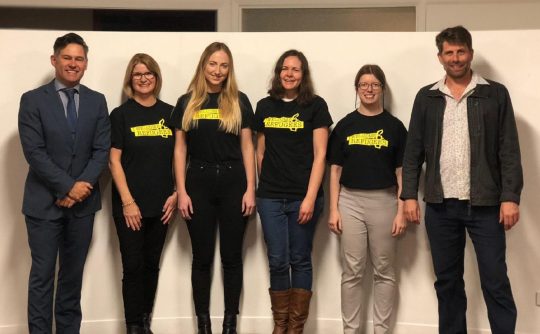
The City of Fremantle in Western Australia also recently passed a motion unanimously in support, with Councillor Sam Wainwright stating, “you don’t shut your door to people who are running for their lives.”
A win for freedom of expression in Malaysia

All nine sedition charges against political cartoonist Zulkiflee Anwar "Zunar" Ulhaque have been dropped in a big win for freedom of expression in Malaysia. Zunar was repeatedly targeted by the former government for his illustrations criticising then Prime Minister Najib Razak.
Lawmaker R. Sivarasa and civil rights lawyer N. Surendran have also been acquitted of sedition charges.
Sadat has a chance to live in safety

Sadat I. was forced to flee his home of Ghana after being beaten by a homophobic vigilante group ‘Safety Empire’ because of his sexuality. After being publicly outed on Facebook in a country where homosexuality is illegal, he sought asylum in Texas where he was detained and threatened to be returned to Ghana despite fears of persecution.
With over 8,000+ emails, petitions, and overwhelming support from the public, Sadat has since been released from the detention centre in Texas, and his asylum case has now been reopened
Keep fighting the good fight.
Words by Adelinah Razali
0 notes
Text
Upcoming WA Events July/August
Looking to take action for human rights but not sure where to start? Mark your calendar - we’ve got some exciting events coming up! Whether your new to activism or the Amnesty movement, a seasoned activist, or just want to have fun and maybe learn more about human rights, there’s an event for you.

(Photo by Ian Schneider via Unsplash)
Activism level: * - Non-activism related, ** - Activist starter, *** - Core activist
Community Is Everything Activist Hook Up (Indigenous Rights)***
Hear all the latest on the Community Is Everything campaign and chat with special guests Emma Bull, National Advocacy Manager at Amnesty, and Belinda Lowe, Indigenous Rights Campaigner.
July 16. Free online.
https://www.amnesty.org.au/events/national-community-is-everything-activist-hookup/
July Refugee Activist Hook Up***
Join activists and special guest Emma Bull, National Advocacy Manager at Amnesty, to chat about engaging with Federal MPs on the #MyNewNeighbour campaign.
July 18. Free online.
https://www.amnesty.org.au/events/monthly-national-refugee-catch-7-2/
Quiz Night by Amnesty International Mount Lawley*
The Mount Lawley group is hosting a Quiz Night (!!) at the Irish Club in Subi! Test your general knowledge skills at this fun and friendly quiz night! Plenty of prizes up for grabs!
Tickets are $20.
24 August, 61 Townshend Rd, Subiaco WA 6008
https://www.facebook.com/events/1016806015147260/
Get Active! Victoria Park**
We’re hosting a Get Active! session for Vic Park and the surrounds. Find out how you can take action for human rights right now, right here and help make change happen. This session will focus on our current refugee rights campaign.
Free event.
August 2, Victoria Park Community Centre, Cnr Kent & Gloucester St, East Victoria Park WA 6101
https://www.facebook.com/events/191681151503559/
Petition Training**/***
Fun training for new and seasoned activists! This session will get you ready with all the skills you need to confidently get petitions signed!
Free event.
August 19, Victoria Park Farmers’ Market, John MacMillan Park, Kent St, East Victoria Park WA 6101
https://www.facebook.com/events/1054530861371101/
-
More TBA. Stay tuned!
Words by Adelinah Razali
#Amnesty WA#Amnesty International#Activist Resources#Refugee Rights#Local Action Groups#Human Rights#Perth
0 notes
Text
This Is What Bravery Looks Like
Bravery is not merely asking for equal rights but demanding them.
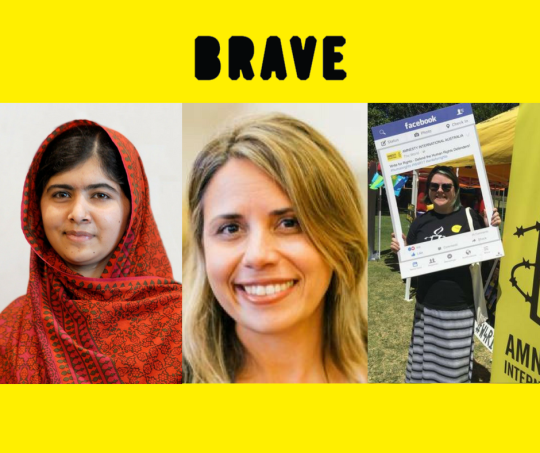
Every day, Brave women here in Perth, across Australia, and all over the world are taking what’s theirs, and urging others to do the same. Here is a short list of ladies to inspire you to always stand for equality and positive change, whether it be on an international, national, local, or even personal level.
YOU ARE BRAVE.
Malala Yousafzai
“Let us pick up our books and pens. They are our most powerful weapons”.

Malala was shot by the Taliban in Pakistan in 2012, after they issued a death threat against her for speaking publicly about women’s right to education. She survived this attack, and went on to launch the Malala fund in 2013 to raise awareness. At her current age of 20, Malala is a Messenger of Peace for the United Nations, a published author and in 2014 won the Nobel Peace Prize, making her the youngest recipient to date.
Tanya Denning-Orman
“It is vital that Aboriginal and Torres Strait Islander people see themselves positively reflected on television and in the media”.
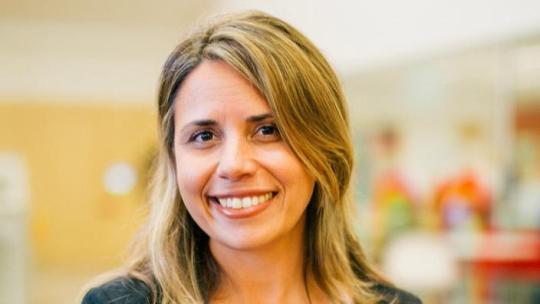
Tanya is a Birri and Guugu Yimidhirr woman who works as the Channel Manager for Australia’s Indigenous channel National Indigenous Television (NITV), a division of television channel SBS. She has worked in the media industry since 1997, and has achieved mainstream exposure on issues affecting the Indigenous community.
Tanya is responsible for the management of programming, NITV-produced news and current affairs programs. She received the National Drug and Alcohol award for Excellence in Media Reporting in 2004 for her SBS series on Fetal Alcohol Syndrome. A core achievement of Tanya’s work at SBS has been successfully leading NITV through a period of rapid change, from a small subscription-based channel into a respected and trusted national free-to-air media brand within a challenging climate of changing technology. Tanya spoke last year at the annual Long Walk Women’s Luncheon on the importance of Indigenous led and self-determined media.
Amber Blake
“You don’t need to be famous or rich to influence the world to be a more positive place. Simply writing a letter or signing a petition has more power than you can imagine.”

Amber lives in Perth and has worked in communications for the Federal Government since 2001. Her main tasks include translating legal-speak into everyday language, writing speeches and website content. Back in the 1990s Amber joined an Amnesty letter writing group at school, starting her interest in how regular people can support human rights. More recently, Amber renewed her work with Amnesty through the local Mt Lawley Group and became involved in the Individuals at Risk national advisory team. This has led to delivering local training sessions and presenting at the WA Branch AGM on campaigns, Write for Rights and Brave. By utilizing her communications skills for Amnesty, new resources and improved campaigning strategies have been added to the activist toolkit.
Words by Rachel Cowcher
0 notes
Text
7 People You Probably Didn’t Know Were Refugees
No refugee story is the same.
Refugees are forced to flee their homes for different reasons - some due to war, poverty, political violence, and some in fear of persecution. But what many refugees have in common is an unconditional desire to give back and make a difference through their unique talents.
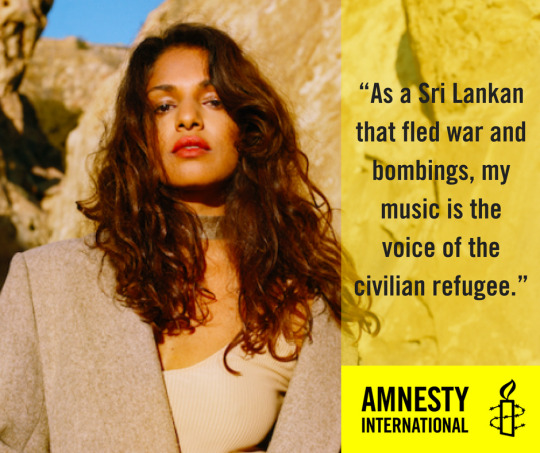
Take a look at 7 prominent people (one for each day of Refugee Week) who were once refugees and now use their platform to advocate for human rights and equality.
1. Anh Do
“There are only two times. Now and too late.”

Starting off the list with an Aussie fav who never fails to make the nation laugh - Anh Do. Fleeing the aftermath of the Vietnam war, Do and his family sought refuge in Australia in 1980 after surviving five days in a nine-metre leaky fishing boat, and two pirate attacks. Through humour and determination he turned his tragedy into comedy and now dedicates his life to making us laugh.
2. Madeleine Albright
"It took me quite a long time to develop a voice, and now that I have it, I am not going to be silent."
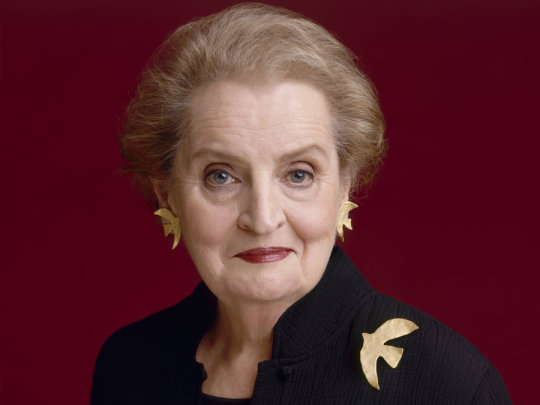
Former US Secretary of State Madeleine Albright and her family fled their home of Czechoslovakia during the Nazi regime. In 1997, she became the first woman to serve as US Secretary of State and the highest-ranking woman in the history of US government. Albright spoke out against President Trump’s immigration ban, saying, “as a refugee myself who fled the communist takeover of Czechoslovakia, I personally benefited from this country’s generosity and its tradition of openness. This order would end that tradition, and discriminate against those fleeing a brutal civil war in Syria."
3. Albert Einstein
"The world is a dangerous place, not because of those who do evil, but because of those who look on and do nothing."

Physics genius Albert Einstein was born in Germany in 1879. Forced to flee due to the persecution of Jewish people in then Nazi Germany, Einstein sought refuge in the United States where his legacy was built. Long after his death, Einstein continues to influence people all over the globe, even inspiring the birth of the International Rescue Committee.
4. M.I.A.
“As a Sri Lankan that fled war and bombings, my music is the voice of the civilian refugee.”
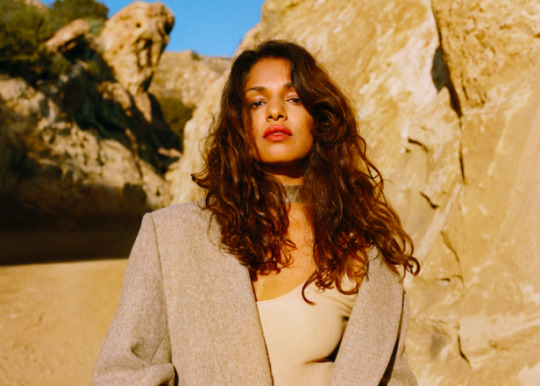
At nine years old, M.I.A and her family fled violence in Sri Lanka and later settled in London. Never shy about her experience as a young refugee or as an activist, she has made headlines for the unapologetic sociopolitical elements of her music. In 2016, she self-directed a music video for her song ‘Borders’ which highlighted the plight of refugees.
5. Bob Marley
“None but ourselves can free our minds.“

Reggae king and cultural icon, Bob Marley fled his hometown of Jamaica to Miami after being shot during political violence. Before his death from cancer in 1981, Marley fused social and political activism with the rhythms of his reggae legacy. Songs like Get Up, Stand Up and Redemption Song, speak to the heart of his pursuit for freedom and equality, and still to this day, makes for a perfect protest track. 6. Iman Abdulmajid
“Refugees are 99 per cent of the time people who have left their countries in fear of their lives. I am the face of the refugee.”

Former model and businesswoman Iman Abdulmajid and her family left war torn Somalia in the middle of the night with just the clothes on their back, and fled across the border to Kenya on foot. Discovered there by a photographer while studying at university, her career took her to the US where she changed the face of fashion and became a leading activist for human rights causes.
7. Wyclef Jean
“It’s important, when you see darkness, to understand that there’s light ahead of that.“

Musician and member of 90′s hip-hop throwback The Fugees, Wyclef Jean was born in Haiti and arrived in the US on refugee status when he was just nine years old. Inspired by both the music and activism of Bob Marley, Jean uses his music to speak about social injustices and equality. He is also the founder of the Yele Haiti Foundation.
There is no cookie cutter refugee experience. But what we know is that it doesn’t matter where you come from, or where you start - it matters what you do next.
For more information about Refugee Week, visit their website. Or, click here to find out how you can help us advocate for refugee rights!
Words by Adelinah Razali
#Amnesty International#Amnesty WA#Refugee Rights#Refugee Week#Refugees#Ahn Do#Madeleine Albright#Albert Einstein#M.I.A.#Bob Marley#Iman Abdulmajid#Wyclef Jean
0 notes
Text
Building A Better Plan For Refugees Through Community Sponsorship
*Suong is a refugee. Suong comes from a country where people are afraid of authority, corruption and they fear for the lives of their family, their friends and their children. Suong has many reasons to be afraid, each more valid than the last.
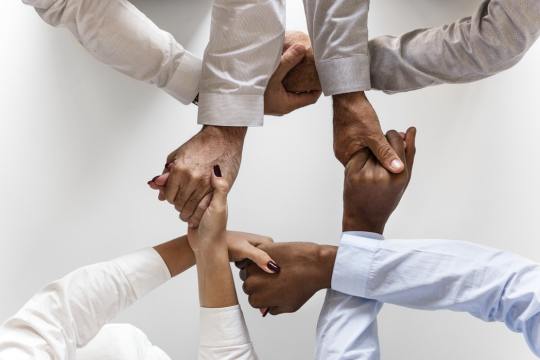
(Photo by rawpixel via Unsplash)
Having to leave in the dead of night with only minimal belongings and running from flashing lights and gunfire, Suong clutched her small child to her chest and ran blindly into the night, eager to reach the harbour. Finally, Suong and her family arrived and they boarded a rickety fishing boat, filled to the brim with other families and young children. A strong odour of sweat, blood and human misery entered Suong’s nostrils and her young son began to cry. Cradling him into her chest, she rocked back and forth, singing quietly, trying to soothe her child.
Suong is a mother, attempting to comfort her child. Suong is a human being, and Suong’s story is just like any other refugees’ story. But we as a society we choose to shut it out. We as a society can and should do better.
Refugee Week is from 17-23 June, and the theme for this years’ week is #WithRefugees - to stand in solidarity and unite as a people. We need to ensure as a nation that people like Suong, who have to flee from their homes in the dead of night, are safe and can live with dignity and hope.
We work tirelessly to advocate for refugees and asylum seekers, including championing solutions to increase our humanitarian intake, end offshore detention and bring refugees to safety.
We believe in a different approach and this year there is an exciting grassroots plan for our refugee campaign. It’s all about people power. We believe in showing a critical mass of people a better plan for refugees and by persuading them to support it, we can force politicians to act.
By growing visible support in your community for an improved community sponsorship program and lobbying your local council to show their support, we will send our Government a clear message – our communities are serious about creating safe ways for their new neighbours to be brought to Australia.
Amnesty has reported that by the end of 2015, 65.3 million people worldwide had been forced to leave their homes as a result of conflict, persecution, violence and human rights violations. Of these:
21.3 million people had to escape to another country. These people are referred to as refugees.
3.2 million people have sought safety in another country. These are people seeking asylum.
40.8 million people were displaced within their own country. These people are described as internally displaced persons.
Right now, the vast majority of the world’s refugees live in developing regions, with half of the 20 million refugees in just 10 countries.
In a ground breaking move of solidarity, acceptance and humanitarianism, in 2015 at the height of the refugee crisis, EU countries offered asylum to 292,540 refugees. 140,910 were accepted into Germany.
We as a society can do better. The Australian Government unfortunately seeks to punish and deter people forced to flee persecution, hunger, violence and climate disasters, seeking safety for themselves and for their families, through its law enforcement agencies.
This is a global issue that requires all governments to do their fair share. Amnesty is campaigning for our governments to show decisive leadership and implement practical and innovative solutions so that refugees can rebuild their lives in safety.
People like Suong and her family deserve the same rights as anyone else and it shouldn’t be her burden that she was born into a war-torn country. People need to help the people and the government needs to listen.
Refugee Week is about raising awareness about the issues affecting refugees and to celebrate the positive contributions made by refugees to Australian society. Celebrated since 1986, Refugee Week coincides with World Refugee Day on 20 June.
For more information about Amnesty’s stance on refugee policy, see Amnesty’s Better Plan for Refugees and the Refugee Campaign Toolkit, or visit the Refugee Week website for more information.
Words by Jacqui O’Leary
#Refugee Rights#Amnesty International#Amnesty WA#Refugee Week#Refugees#Community Sponsorship Program#MyNewNeighbour
0 notes
Text
4 Events You Should Check Out This Reconciliation Week
Communities all across the country will be holding a range of cultural and local events to kick start National Reconciliation Week (NRW) which runs from May 27 to June 3 every year. Embracing this year’s theme of Don’t Keep History A Mystery, NRW encourages Australians to learn and explore the hidden history behind Aboriginal and Torres Strait Islander cultures and achievements.

There are different ways to get involved and engage in culture this week, from film screenings and art exhibitions, to walking trails along some of our history rich community spaces. But no matter how you chose to acknowledge this week, take a little moment to immerse yourself in our shared history, culture, and achievements, and how we can all help pave the road to reconciliation. If you’re not sure, or haven’t decided, how to celebrate this week, here are our 4 free, family-friendly event picks happening around our great state during NRW:
1. Walk for Reconciliation 2018
Bring your families, friends, colleagues and all to this Walk for Reconciliation around Elizabeth Quay to explore and learn about the Nyoongar culture and contribution. June 1, Elizabeth Quay, Perth Event link: https://www.reconciliation.org.au/national-reconciliation-week/nrw-events/a1R6F00000K1H3TUAV
2. Unravelling Mystery - Artitja Fine Art Reconciliation Week If celebration and knowledge through art is more your thing, Artitja Fine Art will be hosting ‘Unravelling Mystery’ - a week-long exhibition of Aboriginal art from remote communities. May 28 - June 1, Building Foyer, 2 Mill Street, Perth Event link: https://www.facebook.com/events/440787029680502/
3. City of Vincent — Reconciliation Week Film Screenings Film, free popcorn, and pre-screening entertainment — all the ingredients you need for a good night out. The City of Vincent will be hosting a free screening of The Sapphires and Bran Nue Dae at The Backlot Perth in West Perth. May 31, 21 Simpson Street, West Perth Event link: https://www.facebook.com/pg/cityofvincent/events/
4. National Reconciliation Week Concert If you live in or near Geraldton, or are heading up for the week, don’t miss out on this free, family-friendly Reconciliation Week Concert featuring the Moorditj Mob — best known for their traditional Nyoongar performance in Times Square! They will be supported by local Aboriginal act The Craig Pickett Band. May 31, Queens Park Theatre, Geraldton Event link: https://www.facebook.com/events/198547880957293/
You can find more NRW event listings on the official Reconciliation Australia website.
Words by Adelinah Razali
#Reconciliation Week#Indigenous Rights#Amnesty International#Amnesty WA#Human Rights#Community Is Everything
0 notes
Text
Equality for Indigenous Australians
Today is the 20th anniversary of the first National Sorry Day, held on May 26 1998. On this day, then Prime Minister John Howard acknowledged the pain and suffering caused by the forced removal of Indigenous children from their families during the time of the Stolen Generation.

The Bringing Them Home report, tabled in 1997, highlighted the grief and loss experienced by the Indigenous community, and the disrespect of their culture, and of their human rights. It was found that one in three Aboriginal children were forcibly removed from their homes and families under government assimilation policies. Sorry Day was created as a step towards reconciliation with Indigenous Australians, and its development was among 54 recommendations in the report.
On 13 February 2008, Prime Minister of the time Kevin Rudd gave an apology to Aboriginal and Torres Strait Islander people for the past policies which "inflicted profound grief, suffering and loss on these, our fellow Australians". This was an important step in the acknowledgment of Indigenous mistreatment, and a movement towards reconciling the Indigenous and non-Indigenous communities of Australia as one. The Council of Australian Governments (COAG) also contributed $4.6 billion in this year to address health and economic development. The creation of the Declaration on the Rights of Indigenous Peoples has been a huge moment in the advancement of International Indigenous Rights, and whilst Australia did originally vote against it, the Declaration was endorsed in 2009. So why is it, that there remains such a gap in Indigenous and non-Indigenous Australians? Statistically, the national imprisonment rate of Aboriginal and Torres Strait Islander adults is around 15 times that of their non-Indigenous counterparts, and for Indigenous children in detention, the rate is around 23 times higher. Additionally, the rate of unemployment for Indigenous Australians is over double that of the non-Indigenous. The Australian Human Rights Commission reported in 2013 that 20% of Aboriginal women experienced physical violence within the 12 months prior, and that Indigenous women were at least three times more likely to experience sexual violence than non-Indigenous women. The Human Rights Watch reported last year that over half of Indigenous prison populations were living with a disability, of a physical, psychosocial or intellectual nature. Whilst there have been calls for an independent watchdog to be introduced in every state and territory to monitor the improvement of outcomes for these people, this has yet to be enforced. It is also unlikely that changes such as these will be able to come about, with the federal coalition government cutting $534 million from the budget for Commonwealth-funded Indigenous programs. Even now, Amnesty International is working with Indigenous juveniles in detention who have been held in prolonged solitary confinement and are experiencing treatment which can be described under International Human Rights conventions are torture. The 2018 Closing the Gap report shows that targets to improve life expectancy for Indigenous people by 2031 is not on track to be met. This cannot be achieved until the Australian government begins to deal with the leading causes of Indigenous child death, such as birth and pregnancy complications, foetal development disorders, and other cardiovascular and respiratory disorders. In fact, only one of seven of the targets from the Closing the Gap report is on target to be met, which is halving the gap in completing high school by 2020. The cycle of these inequalities need to end so Indigenous Australians have the same basic human rights as their non-Indigenous counterparts. The matter of "reconciliation" faces its biggest hurdle in its definition. As Patrick Donson writes in his State of Reconciliation report, reconciliation has come to mean "improved services and economic participation for Indigenous people", which is reconciliation on settler Australian terms. The forced closure of Aboriginal communities and failure to recognise Native Title claims is a failure from the Australian government to acknowledge Aboriginal connection to the land, and is a lack of respect to Indigenous culture. Whilst the improvement of Indigenous health, education access, and life expectancy is seen as a priority to the Australian government and remains of upmost importance, Indigenous culture needs to be recognised as an important part of Australia's history and current society in order to truly integrate the Indigenous community. Words by Rachel Cowcher
48 notes
·
View notes
Text
Building Communities, Relationships and Skillsets
Amnesty WA’s biannual Skillshare is about to land at the beautiful green space, Earthwise Community in Subiaco.

(Photo: Volunteers Marsha and Ashley and Victoria Park residents Mark and Amberley attended the volunteer workshop last year.)
One of the organisers, Amnesty International WA Training Team, Brendan, said he was enthusiastic about the Skillshare.
“There’s a community of people who think and feel the same way I do about these issues – so that’s what I’m excited about for the upcoming Skillshare,” he said.
Brendan got involved with Amnesty back in university after realising it was time to do something.
“I knew enough about the state of the world that I wanted to get involved [with Amnesty],” he said.
Along with some other university students, Brendan set forth creating Curtin University’s diligent Amnesty team.
“We knew that a better world was possible and we knew that we wanted to be a part of the change [in the world].”
Attending the Skillshare is not only a great way to learn from one another and hear each other’s story – but it’s a great way to connect with your fellow activists in a meaningful way, and encourage one another in their good work.
As a grassroots organisation Amnesty International is committed to building power from the community level and free workshops like this are invaluable opportunities to help communities build supportive and powerful networks.
On Sunday 29th April from 9am-5pm, you will experience a full day of workshops, values-jamming and relationship building. Sessions are run by activists working for Indigenous, Refugee, Women’s and LGBTQI+ rights, as well as Amnesty leaders from across the country.
Brendan encourages all attendees to build that community, build that relationship and build that skillset.
“Together we can make that change we want to see,” he said.
Lunch is included and after the Skillshare, we are going to the pub. We can’t wait to see you there!
When: Sunday 29th April , 9am to 5pm
Where: Earthwise Subiaco, 315 Bagot Road, Subiaco
Words by Jacqui O’Leary
#WA Central#Activist Resources#Skillshare#Western Australia#Human Rights#Amnesty International Australia
0 notes
Text
#VoicesOfActivists: Jaime Brownsdon
Through the impenetrable darkness of human rights violations, oppressed and marginalised people without voices and every injustice that becomes a catastrophic weight on the shoulders of those suffering indescribable pain, loss and grief – are the activists who work towards enabling the burdened to rise and the voiceless to reclaim their voices. Here are their stories…
Feeling the weight of having to justify her passion for activism and human rights campaigning in the past, Jaime Brownsdon, Curtin University Amnesty WA convenor, emphasises the importance of feeling heard and the power of communication, when it comes to telling stories and highlighting injustices.

(Photo: Jaime Brownsdon and Amnesty Curtin Treasurer Amberly Kilmartin)
“Having a conversation is the best way to spread awareness and educate - and being able to help someone understand why the issue is important and why they should care is really awesome,” she said.
Amnesty was different from other experiences, she explained.
“I met a community of people who are all like-minded. I learnt that a lot of people are passionate about similar things and that together, we can actually make a difference.”
Having cared about human rights from a young age, Jaime continued to follow her heart for social justice and became the Amnesty WA convenor at Curtin University, fighting for rights from the student perspective.
“I live in an area where a lot of the families have gone through some incredible hardships. I've had the opportunity to hear the stories of just some of the students at the local school, and they really inspire me to make a difference so that kids like them get a better and fairer future.”
This experience had humbled her.
“[After meeting activists like] Mark Brisbane and Amberly Kilmartin, one year on, they still amaze me with their commitment and passion - something which has been a great motivator and inspiration for me,” she said.
After seeing a number of exciting changes in the way people view human rights and advocacy, Jaime said that Australia had a lot to be proud of, but admitted that the country still had a long way to go.
“Australia has made some really great progress in the past and has been a leader in civil and political rights. Unfortunately, the country still perpetrates human rights abuses, especially in the treatment of refugees and Indigenous people,” she said.
“It's important that Australia continues to grow its activist community, and continue to petition for changes so that we can be free of any human rights abuses.”
Jaime admits that activism will always be important in maintaining a society that is welcoming and caring of all people.
“I've really loved being able to use my voice to share stories and educate others on important issues that I'm passionate about,” she said.
Activism is working towards giving all people a voice, regardless of gender, skin colour, religion or sexuality and one of Jaime’s key moments for human rights wins was when the Same-Sex Marriage Bill passed.
“Though there is still work to be done for LGBTQI+ rights, same-sex marriage is a huge win and a true testament to the Australian spirit and values that make us Australian,” she said proudly.
“I learned that a lot of people are denied rights that I took for granted growing up all because of differences as simple as the country they were born, the colour of their skin, or the people they choose to love.”
You can find Jaime lobbying for human rights at Curtin University, by contacting her on [email protected], or following Amnesty Curtin University on Facebook.
Words by Jacqui O’Leary
#WA Central#Voices of Activists#Local Action Groups#Amnesty International#Human Rights#Activism#Curtin University#Perth#Western Australia
0 notes
Text
#VoicesOfActivists: Michelle Hinton

Through the impenetrable darkness of human rights violations, oppressed and marginalised people without voices and every injustice that becomes a catastrophic weight on the shoulders of those suffering indescribable pain, loss and grief – are the activists who work towards enabling the burdened to rise and the voiceless to reclaim their voices. Here are their stories...
Back in her high school days, Michelle Hinton, Amnesty WA Refugee Rights Group convenor, would spend her lunchtime writing letters, discussing current human rights issues and having conversations about things that mattered, with her Amnesty group.
Passionate about making a change in the world, Michelle found her feet in her first Amnesty meeting.
“[I loved] meeting this group who were so friendly and welcoming, and so passionate about helping others with their time and actions,” she said.
Refugee rights are very important to Michelle and issues in Australia and globally have inspired her activism work with the group.
“There are so many causes out there that are important and so many groups that need extra voices to help them be heard,” she said.
Speaking fervently about human rights wins that impacted her, Michelle discusses why Peter Greste’s story is important.
“[It changes you, seeing] the footage of Peter Greste hearing the news that his colleagues, Mohamed Fahmy and Baher Mohamed, who were jailed with him, had been released. It’s just such a pure moment, and we want to create more of those.”
Michelle has an appreciation for all of those who commit time to Amnesty.
“There’s so much hard work and dedication that goes on behind the scenes to allow us to do what we do,” she said.
“All of the people involved in Amnesty inspire me; they work so hard and really care about what they’re doing.”
One of the activists that inspire her is fellow Amnesty WA Refugee Rights Group, Ashley Macmillan.
“She devotes so much of herself to activism and maintains such a good spirit,” she said.
Moving forward into the new year, Michelle’s main goal for 2018 is to increase the reach of the Refugee Rights Group.
“From getting petition signatures, and getting more participants in actions, to influencing more people to care that little bit extra about the awful things that are happening to our fellow human beings” she said.
“Everywhere needs human rights activists. There are people all over the world needing help, and it doesn’t matter where that voice telling them they are not alone is coming from, as long as it’s there.”
The aim of the Amnesty WA Refugee Rights Group is to dispel the myths that surround the refugee debate. The group wish to educate the Australian public on the ineffective, inefficient, inhumane nature of the current policies in place.
You can contact Michelle on [email protected] or visit their Facebook page for more information or to get in touch.
Words by Jacqui O’Leary
4 notes
·
View notes
Text
Time’s Up, Twitter
Coincidentally, the day I decided to write this article was February 6th, 2018 — the 100 year anniversary of the passing of the Representation of the People Act in the United Kingdom. This was the day women (only those aged over 30, owned property, were a university graduate or were a member of, or married to, a member of the Local Government Register) were granted the same right to vote as men. Although this was a huge step in the movement towards equal rights for women, I ask, how can it be that to this day, women are still needing to fight to be treated fairly, and with the respect that they reserve?

(Photo by @freestocks on Unsplash)
In 1970, the UK parliament released the Equal Pay Act, which should ensure that all women received the same income as their male colleagues. But in light of the recent BBC pay-rate reveal, which found a 9% difference in annual salaries between male and female workers, it is clear that women are still not viewed as being equal with their male counterparts in the workplace.
Here in Australia, over a quarter of women have reported being harassed in their place of work, with the Australian Bureau of Statistics Personal Safety Survey finding that over half of all women have experienced sexual harassment in their lifetime. For 92% of these women, this assault came from a male that they know.
The #MeToo campaign, described as a "national reckoning over sexual assault and harassment", began with a status on Facebook, which was copy and pasted by women who had experienced sexual abuse or harassment, to convey just how large this problem really is in modern society. This movement has not only shone a light on this horrific behaviour, but also served to create a sense of empowerment and community for the women who have felt alone in their experience of abuse, and displayed the power of social media in the dissemination of important messages.
Along with this, the #TimesUp campaign, supported by many well-known female celebrities such as Natalie Portman, Emma Stone, and Mila Kunis, begun with an open letter signed by over 300 women from the entertainment industry, with the aim of encouraging women to protect themselves from sexual misconduct, and the consequences that may arise from reporting it. This movement, commencing with a full paged advertisement in the New York Times, pledged over 13 million dollars into a fund for the legal defence for women in less privileged professions, to allow them to confidently speak out about their experience without fear of retribution.
The open letter to the New York Times acknowledged that due to "systematic gender-inequality and imbalance of power", an environment has been created where many women today share a "common experience of being preyed upon, harassed, and exploited by those who abuse their power", and that this harassment has been suppressed, for fear that speaking out would result in further attacks or other consequences. But #TimesUp speaks to exactly that - time is well and truly up for this kind of behaviour - “now, unlike ever before, our access to the media and to important decision makers has the potential of leading to real accountability an consequences". The time is here for women to utilise media visibility and the strength of their combined voices to put an end to inappropriate treatment and harassment once and for all.
With this power in mind, it has come to the attention of Amnesty International (and many, many others the world-over), that a high number of women have reported frequently experiencing sexual harassment via Twitter, with minimal policy and enforcement changes having taken place to prevent this behaviour. CEO Jack Dorsey has publicly stated that policy changes have been submitted to the company's "Trust & Safety Council" for review.
The current policy on unwanted sexual advances is that enforcement action is only taken when a report is received from a participant in the conversation. Twitter has said that it will be looking into leveraging past interaction signals, such as block and mute, when considering these cases. Twitter has stated also that it will be taking enforcement action against groups that glorify violence. Currently, with pornographic content being allowed on Twitter, it is challenging to determine whether or not sexual charged conversations or the exchange of sexual media may be wanted.
In December 2017, Twitter announced that new rules would be applied to accounts who promote violence, and that any accounts who were repeatedly in violation of this rule would be permanently suspended, including violent threats and sexist comments.
Yet there are still countless cases of women coming forward and reporting feeling unsafe and sexually harassed on social media. We call for Twitter, and all other social media platforms, to be stronger in implementing their own policies. We live in a time where we all know know this behaviour is happening, all too often, and it is unacceptable. Times Up, Twitter.
Words by Rachel Cowcher
0 notes
Text
Life In Looma

Going straight from life as a university student in Perth to living in Looma, a small remote town inland from Broome, was quite an adjustment for Kate Ditchburn, who is beginning her third year teaching in the community.
Since traveling to the Pilbara community Punmu in high school, Kate said that she knew that she wanted to live in the Kimberley and work remotely.
“The job is completely different to other jobs, particularly as building relationships has never been more important than in an Aboriginal community,” she explains.
Unlike working in a suburban classroom, planning can be difficult and having an adaptable approach has been Kate’s key to success.
“One day you could have ten kids, the next it could be eighteen and then the next could be five. Also the range of student abilities in a class is huge - some kids struggle to write their names, whereas others are reading novels”.
Despite these challenges, the strong community bond is what Kate loves about Looma life. Although it took some time and many games of after-school basketball to bond with the kids, Kate believes that it was worth the effort.
“I am now feeling like an included member of the family,” she said.
Kate’s passion for sport was something she discovered she had in common with the Looma community.
“The football teams would travel up to six hours every weekend for their games, and half of the community goes along to support,” she explains.

From this passion, Kate and her friend Sarah started a football team for girls in 2016.
“It wasn’t going to be anything big, just a great opportunity to get the girls involved in something for their health,” Kate said.
As soon as word went around town about the team, they had a coach come on board and a full team of girls signed up.
Kate said that the most rewarding aspect of creating the team was seeing the town come alive during sporting matches, and their passion for supporting one another.
“It gave the young girls hope and ambition, and we now have one of our girls who graduated last year playing down in Perth, which is an awesome achievement,” she said.
“I have no doubt that I will be seeing some of our Looma girls running around in the Australian Women’s Football League (AFLW)”.
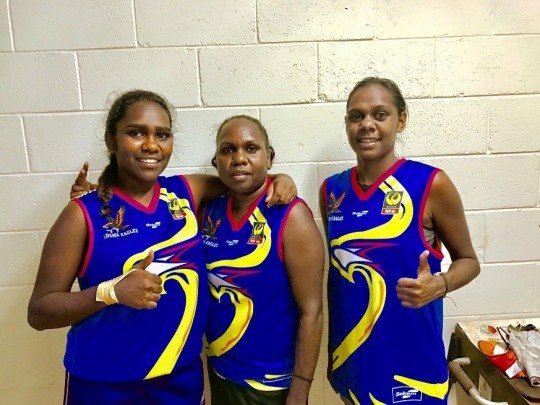
Reflecting on her time living in a remote Indigenous community, Kate said she has learnt about the importance of community and family, and how western cultural influences have greatly impacted on this.
Kate said the government system for education support in communities has room for improvement.
“The people that do work and make a living for themselves often don’t receive any education support, and then cannot afford to send their kids to school,” she explains.

Kate said she sees herself remaining a part of the Looma community for years to come, and hopes to continue working to better the lives of her students.
“I would love to develop a health initiative that is effective in communities,” Kate said.
“I would like to see improved diets and education about nutrition, exercise and organised sports for kids; stuff that most of us take for granted”.
Words By Rachel Cowcher
#WA Central#Indigenous Rights#Human Rights#Looma#Western Australia#Australia#Amnesty International#Amnesty WA
0 notes
Text
Amnesty WA is doing justice!
Welcome to Doing Justice, a blog run by the team at Amnesty International WA!

Here at Doing Justice, we’ll introduce you to the people of Amnesty WA who make it all happen, share with you the stories of human rights defenders in our community making change, and give you all the information you need to join us in protecting human rights across the globe!
We’ve got big things planned for 2018 and we want you to be part of it every step of the way. We hope you’re as excited as us in taking action for human rights and bringing about change.
Let’s get to work 💪
Amnesty WA x
0 notes